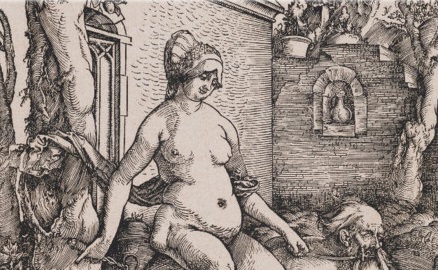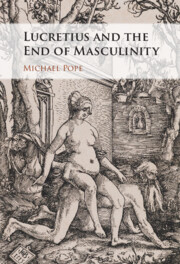
From the beginning of his poem, Lucretius is decidedly unsubtle. In quick succession the audience encounters the language of pleasure, verdant flora, lusty fauna, sexual reproduction, and an erotic scene between Venus and Mars that gushes with sensuality and hungry orifices. Some readers probably feel like it is a bit of a bait and switch once the poet settles into describing indivisible primal matter, void, and atomic motion, cohesion, and dissolution. When sex does come into view again later in the poem, the depiction is more despairing than titillating. And for those hoping that the poet might offer as buoyant a peroration as he does an opener, well, the closing lines as we have them today could not be any less voluptuous: a nightmarish plague where decaying corpses are piled in religious sanctuaries and survivors fight over funeral pyres to burn their dead. Still though, close emphasis on sensuousness and the tangibility of corporeal existence prevails right to the final verses.
Lucretius and the End of Masculinity is my attempt to understand the way Lucretius describes the intimate beauty and the crass realities of being material. Existing as a body with the ability to see and hear and touch is all quite wonderful from one perspective. From another, it can be a little disturbing to realize that every smell and taste is particulate and we experience the world outside our bodies because matter from that realm is constantly entering us. In the blunter language of Lucretius, when I smell you, bits of you shear off and lodge in me. Every conversation, every exchange of glances, every sharing of space is an interpenetration and commingling of our physical stuff. On a larger scale, one’s life is a continual trafficking of atomic issue and receipt. To have both sense perception and sentience is to be radically porous and incontinent sieves from cradle to grave, for male and female bodies alike.
But Roman men, at least according to rigorously policed cultural scripts, were supposed to be disciplined and self-contained agents. Legally, their bodies were inviolable. By the same logic, masculinity was a thing demonstrated by external assertion. Roman manliness was, at its core, inflictive. Nature’s laws, as Lucretius shows, obliterate such thinking and render all people mutually prone to ingress and egress, discharge and acceptance, passivity and action, regardless of biology or social convention. A provocative and deeply subversive proposition, no doubt! The allure of Lucretius’ message, however, is not about license, but the liberation it offers Roman men. They can be free from the rat race, that unrelenting pressure to exert, compete, and dominate to prove themselves manly. Further, when they accept Lucretius’ assertion that every physical sensation ceases at death, all people, men and women, can live emancipated from fear of mortality and the self-destructive cravings this terror induces. The charm of Venus’ seductive distraction of Mars away from war is not a cipher for appetitive or erotic indulgence, but rather the prospect of a tranquil life for oneself, for one’s circle of friends and family, and for the commonwealth. My reading of Lucretius is that his poem was a fundamentally optimistic act of resistance against the culture of aristocratic Romans in the Late Republic.
My hope is that this book will assist non-specialists and critics of De Rerum Natura in observing how Lucretius purposefully and playfully employs the scandalous language and imagery of emission and incursion throughout the poem. This project was, of course, a laborious undertaking, but it was a pleasurable one too. I hope that this is evident for readers.

Latest Comments
Have your say!